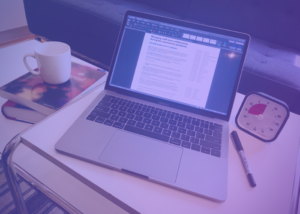Peter Dickison, on his first day working from home during the Coronavirus pandemic, passes on some tips learned from many years as a freelancer…

You work in an office every day – same environment, same hours, same routine. You catch the train to work (sitting in the same carriage), chat to the same people, eat the same overpriced sandwich from that little place in the food court (you know the one I’m talking about).
Then a global pandemic arrives. The company sends you home to work. What do you do?
For many, working from home after years in the office is a shock and alien to their experience. It can be difficult to cope, get the work done, and stay motivated, let alone be productive, healthy and happy.
Thanks to many years spent working from home as a freelancer, and endless discussions on the subject with other freelancers, I’ve learned a few things about how to survive an extended period of working from home, and flourish while doing so.
Do things right, and you’ll get more done than you ever did at the office, maintain your sanity, and experience freedom like you’ve never known before.
I’m not going to talk about technical stuff, like how to set up remote workflows or communications, but about the individual things you can do to make working from home so free and satisfying you won’t want to go back to the office (and so productive the company won’t want you to, either)!
Here we go…
1. Get into the right routine and mindset
First thing: you’re not hanging out at home, doing ‘some work’ – you’re GOING TO WORK. That’s the mindset you need. Period.
The following help:
- Make your bed. Have a shower. Get dressed. I can’t stress enough the HUGE difference this makes to how you feel the rest of the day. HUGE.
- Start working and finish working at the same time every day. Try to keep these hours as close as possible to what you’re used to at the office. Make the same effort to get to your desk, dining room table (or wherever you work at home) as you would to get to the office on time. Without the commute, you really have no excuse to show up late.
- Take regular breaks and take them at the same time. Your body is already trained from the office to operate in a set pattern, so work with that. You’ve built the habit – keep it. Then, when you sit down at 8:30 or 9am or whenever you can easily switch into ‘work mode’.
2. Eliminate distractions
Being in the office tends to focus one on work, while the home seems filled with playful, non-work distractions. It’s tempting to toast some hot cross buns, fire up Netflix and half-work, half-binge, but “that way madness lies”!
If focus is a problem for you:
- Break tasks into short sprints. Something like the Pomodoro technique (where you work in 25-minute or half-hour bursts with short breaks between) works well. Add a visual and audible task timer (I use a Time Timer), and this system can do wonders to keep you focused and churning out the work. There are loads of Apps for Pomodoro, and apps and physical devices are available for timers (even the basic one in your phone is fine). Google is your friend.
- Turn off your mobile phone if you need to concentrate (or put it on silent and charge it in another room). This is more about personal calls and texts: the company will still message your laptop or get you via email if necessary.
- Lock yourself out of certain social media and messaging apps or websites by using a distraction-blocking app. Freedom is my personal favourite. If social media is getting you down, apps like this are a solution.
- Don’t do your housework during work hours. This is procrastination at its finest. Your laundry isn’t folded and put away or your cupboards reorganised when you’re at the office. DO water your plants, though – they’ll love the extra attention.
3. Have a designated work area or space
This really helps you separate work from home, as you can walk away from it at the end of the day. If you don’t have a permanent study or desk, and use a shared space like your dining table, try to pack your stuff away at the end of each day so your work isn’t still staring at you while you’re eating dinner. Speaking of eating…
4. Don’t forget to eat
- But don’t forget that you might not be as active as you were at the office. Eat a level appropriate to your new, likely reduced, activity level or you’ll be upsizing your clothes in no time! For example, I walked over 10,000 steps every day getting to and from the station, walking around the office and out at lunchtime, and running up and down many flights of stairs. At home today I’ve walked about 50m in total, plus putting out the garbage. Oh dear.
- If you made and packed your lunch every day (whether for the week or the night before), keep doing it. Make your lunches for the week or make lunch the night before, put it in the usual container, stick it in the fridge and grab it out at lunchtime. This will help remind you to eat and allow you to better control the amount (see the point above).
- Coffee is not a meal. Potato chips and biscuits are not a meal. And while ordering Uber Eats from your local restaurant or takeaway may be virtuous and supportive of local business during these unusual times, watch the snacking!
5. Exercise
If you went to the gym regularly, go to the gym while you still can and be scrupulous about hand hygiene – wiping handles and equipment before and after use, not touching your face, and keeping your distance from people, etc. If and when the gyms close for a time (as they have overseas), you still have options:
- Depending on your personal (or government-mandated) restrictions, put on your exercise gear and go for a walk or a run around the streets near your home. Starting and finishing at your front door eliminates the need to catch public transport or drive anywhere. You could also find a nearby flight of stairs and hike up and down it. You can easily keep your distance from other people when doing this and get some great exercise. If you have a dog, it’s a great opportunity to take them for a walk.
- If you really don’t want to venture out, look at streaming options for exercise: home workout classes, yoga, exercise apps, ‘15-min workouts’, and more, are all available online. Make them part of your everyday. Don’t turn into a potato. Please.
6. Make an effort to talk to someone during the day
Especially if you live alone, or are alone during the day, make time to talk to a friend, your workmates (instead of just messaging or emailing them all day) or a family member. When you’re used to working in a social environment, even if you’re an introvert, it can be lonely being stuck at home. Having pets helps here, and your dog or cat will love having you around.
7. Maintain your perspective
Note that people in offices spend a lot of time doing things other than focused work on the task at hand – standing around the water cooler, chatting in the corridor or staff kitchen, throwing miniature basketballs through miniature hoops, drawing satirical cartoons on the whiteboard (you get the idea). When you work at home, unproductive time is more obvious. Don’t be too hard on yourself if you’re not 100% working like a maniac 100% of the time; real people in real offices don’t. Conversely, don’t worry if you power through your work and finish earlier in the day than usual – without the distractions of the office you can be more productive, so enjoy the feeling.
8. You’re one of the lucky ones
Remember that if you have the kind of job that lets you work from home, you’re not sick, and you’re still getting paid, you have it easy. Spare a thought for the thousands of casuals in hospitality, retail and other industries whose jobs can’t be done from home, and who now have no income when their business is forced to close its doors. And spare a thought for our health workers, first responders, those most affected by the coronavirus and their families, and those most at-risk like our parents and grandparents. By working from home you’re helping to slow the spread and keep them safe.
Peter Dickison is a copywriter and digital producer with FCB Group, HR Assured and enableHR. As a former freelance writer and photographer, he has over 15 years’ experience in working from home.




